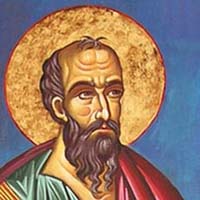Offer a "Living Sacrifice"
In the last five chapters of Romans, Paul draws some practical conclusions from the dense doctrinal considerations of the first half of his letter. It all begins with a statement which could be described as a manifesto for Christian living: I appeal to you therefore, brethren, by the mercies of God, to present your bodies as a living sacrifice, holy and acceptable to God, which is your spiritual worship (Rmns 12:1).
Seek the Things that Are above
John Hemer, 17/10/2016
I found when sharing the gospel in Pakistan, many Hindus would tell me that they believed in Jesus as the incarnation of God, but only one among many. Their basic world view was the Hindu one, a world populated by hundreds of thousands of gods, and they found a place for Christ in that.
The Church Is the Bride of Christ
John Hemer, 03/10/2016
Paul spent two years at Ephesus (Acts 19:10) much longer than anywhere else, apart from the time he was under arrest at Rome. One of the reasons people doubt his personal authorship of the letter to the Ephesians is that the style is so different to his other letters.
I Live
Bernardita Dianzon, FSP, 19/09/2016
I live by the faith of the Son of God who loved me and gave himself for me (Gal 2:20). There is now a growing consensus among New Testament scholars about an important expression in the Pauline letters concerning the condition-for-salvation (of, for instance, unbaptized infants or non-Christians).
The Holy Spirit and our Newness of Life
John Hemer, 05/09/2016
If the Law was the thing that enabled a Jew to be at rights with God, in some ways its Christian equivalent is the Holy Spirit. A Jewish boy at the age of twelve makes his bar mitzvah – making him a “son of the commandment” or son of the Law.
Paul on Dying to Sin
John Hemer, 22/08/2016
Who was it said that “an Englishman is someone who, in the lottery of life, has drawn the winning ticket”? The early Paul was like a football fan who managed to secure a seat for the FA cup final. In the meantime, he strikes up a friendship with the manager of Wembley stadium who tells him to just to turn up on the day and meet him at such and such a place for a great spot.
Paul's New Understanding of freedom
John Hemer, 08/08/2016
I once heard a lapsed Catholic say that one thing he admired about the Catholic Church was that it allowed people “freedom of conscience”—presumably the freedom to judge for themselves what was right or wrong, good or bad. Is that the “freedom” Paul taught, or is it an example of what Augustine said about freedom without Christ being merely the freedom of a runaway slave?
The First Letter of St Paul
Bernardita Dianzon, FSP, 25/07/2016
We sometimes hold the mistaken notion that the sequence in which the New Testament books are arranged in our modern-day editions follow the time or chronology of their writing.
Paul And The Law
John Hemer, 11/07/2016
Is Christianity a set of rules and directives we have to follow, or is it living freely without laws but according to the grace of Christ and the promptings of the Holy Spirit? No one in the history of the world has understood and articulated the problem of Law and religion better than St. Paul, particularly in Romans and Galatians. No one in the history of the world has understood and articulated the problem of Law and religion better than St. Paul, particularly in Romans and Galatians.
Paul's Parental Role
Armanda Santos, FSP, 27/06/2016
Such was our affection for you that we were prepared
to share with you not only God ’s good news
but even our very selves, so dear had you become to us . . .
[Y]ou also know how, like a father with his own children,
we exhorted you, encouraged you, and urged you
to conduct yourselves in a manner worthy of God. ... 1Thes 2:8, 10–12



















